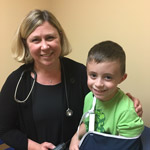
It’s not really unusual for kids to complain of tummy troubles of some kind throughout their lives. As a parent, it can be very difficult to determine when it’s just a simple stomachache or something more serious.
Most symptoms are not dangerous at first but can cause bigger issues down the road if left untreated.
Common GI symptoms in children include:
- Constipation
- Diarrhea
- Gas and bloating, often accompanied by abdominal pain
- Upset stomach with or without vomiting
GI Disorders and How They Are Found
GI disorders in children include lactose intolerance, food allergies, inflammatory bowel disease, Crohn’s disease, and ulcerative colitis. One of the best ways to quickly diagnose these disorders is by keeping a diary of what symptoms your child is experiencing and when they occur. Record what and how much they are eating, and the time of day the symptoms are occurring. This information will be important to share with your doctor so they can develop a plan to alleviate your child’s discomfort. Diagnosing these disorders can be difficult and may require a combination of things to provide relief, including:
- Medications: Stool softeners, laxatives, antacids, histamine receptor blockers, proton pump inhibitors are some that your doctor may recommend.
- Nutritional management: The doctor may recommend dietary changes include an elimination diet if food allergies or intolerances are suspected. Determining whether recommended dietary intake is adequate is an important approach and is helpful when assessed by a registered dietitian. Too little fiber or too much dairy, insufficient vitamin intake, and hydration status should be calculated and used to develop the desired meal plan.
- Medical testing: The doctor would make any recommendations for testing after a complete examination of your child.
Treatment and Symptom Management
Treatments differ based on what symptoms the child exhibits. As mentioned above, medications and nutrition therapy are recommended as the first line of defense. There are also non-medical techniques such as relaxation exercises and behavior counseling. GI disorders are real and can be complicated. It is important to be patient and prepared for some trial and error when alleviating symptoms. GI disorders can be unique to the individual, meaning what works for one person may not work for everyone. Be open to discussing your case with the doctor and involving a registered dietitian specializing in pediatrics as a key resource in your child’s care.
The information and content on our website should not be used as a substitute for medical treatment or advice from your doctor.

